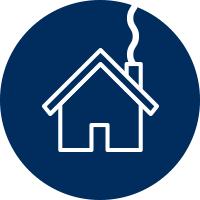top of page


1. Inspect your roof and gutters
-
Clean your gutters or work with a trusted professional or contractor to have your gutters cleaned. This will prevent them from freezing and causing additional blockages. Blocked gutters can allow water to seep into your roof or flood your homes foundation.
-
Insulate or ventilate your attic. Parts of your attic that may not be well insulated are; pipes, vents, chimney systems, and light fixtures. If your attic wasn't built with a ventilation system, contact a professional about doing so before winter.
-
Invest in a roof rake. The average roof can hold up to four feet of snow before it is stressed. Buying a roof rake can help to protect your home during the blizzard months.
2. Store items that aren't used/needed in the winter.
-
Store your mower. To properly store your mower, either run the engine until the gas tank is empty or add fuel stabilizer to the tank of gas. By emptying the tank or treating the fuel, the mower is now protected from erosion while in storage. Make sure to remove the battery and store the mower in a dry area.
-
Turn off outdoor water and store hoses. Turn off the water at the shutoff valve and open the outside faucet until the remainder of the water runs out. At the inside shutoff value, drain the remaining water out of the pipe.
-
Drain and turn off sprinkler system. Draining your sprinkler system will prevent the water from freezing/expanding and breaking the pipes. Contact your local irrigation specialist to avoid costly repairs in the springtime.
3. Prune plants and trees
-
Spending time pruning can save you thousands of dollars in damages. Prune branches hanging near your house, gutters, or roof before it gets too cold. Branches can break from heavy snow or ice and can cause major damage to your home.
4. Seal cracks around your home
-
Prevent air leaks/drafts from entering your home. A good way to seal warm air in the house and keep cold air out is to install weather stripping. Places to check for leaks/drafts are; windows, doors, plumbing areas, air conditioners, mail chutes, vents, and electrical/gas lines.
5. Protect your pipes from freezing
-
A burst pipe can cost more than $5,000 in water damage! There are several ways that you can prevent your pipes from freezing.
-
When you're out of the house, don't turn down your heat too much.
-
To provide relief for your pipes, let the faucet drip during serious cold spells.
-
Caulk up cracks or holes in your walls.
-
Wrap any exposed or vulnerable piping with insulation.
-
6. Get your furnace serviced
-
Inspect your furnace or have a HVACR professional do it for you. During the inspection the furnace should be cleaned, checked for any leaks or unhealthy gases, and the filter should be changed. The air vents and ducts should also be cleaned.
bottom of page






